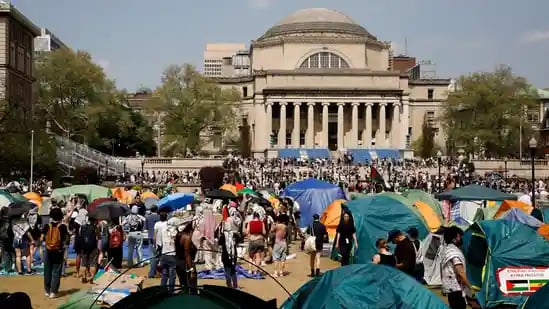Columbia University Student's Mic Cut Off During Anti-Israel Rant at Commencement Ceremony
The cutting off of a student's microphone during an anti-Israel rant at Columbia's commencement ceremony has spotlighted deep-seated issues within the university community.
ACTIVISMCOMMUNITYFEATURED


The cutting off of a student's microphone during an anti-Israel rant at Columbia's commencement ceremony has spotlighted deep-seated issues within the university community.
Incident at the Commencement Ceremony
In a dramatic and controversial turn of events, a Columbia University student’s microphone was cut off during an anti-Israel rant at the commencement ceremony. The incident has ignited heated debates on free speech, campus politics, and the university's handling of sensitive topics.
What Happened?
The student, during his allocated speech time, began to criticize Israel, leading to immediate backlash. As his comments grew more intense, event organizers intervened by cutting off his microphone, abruptly ending his speech. This incident has since gone viral, drawing attention from media outlets and sparking discussions across various platforms. Was this an act of censorship or a necessary step to maintain decorum?
Reactions from the Campus Community
The response from the Columbia community has been mixed. Some students and faculty members argue that the student's right to free speech was violated, while others believe that the commencement ceremony was not the appropriate venue for such remarks. How should universities balance free speech with maintaining a respectful and inclusive environment?
Alumni Discontent and Rising Tensions
This incident is not isolated. It comes amidst growing tensions on campus regarding Israel-related issues, contributing to a rising trend of alumni discontent. The recent anonymous $260 million donation to Bar-Ilan University by a Columbia alum, perceived as a snub to his alma mater, underscores these tensions. Are alumni increasingly frustrated with Columbia's handling of controversial topics?
University Response: Walking a Tightrope
Columbia University faces a challenging task in addressing this incident and the broader trend of alumni discontent. The administration must navigate a complex landscape, balancing the need to uphold free speech while fostering an environment of respect and inclusion.
A Statement from the Administration
In a statement, the university expressed its commitment to free speech but emphasized the importance of context and setting for such discussions. The administration highlighted that commencement is a time for celebration and unity, suggesting that there are more appropriate forums for political discourse. How can Columbia ensure that all voices are heard without compromising the integrity of important events?
Addressing Alumni Concerns
The university must also address the concerns of its alumni, many of whom feel that the campus environment has become increasingly hostile to pro-Israel perspectives. The substantial donation to Bar-Ilan University is a clear indicator of growing dissatisfaction among alumni. What steps can Columbia take to re-engage and reassure its alumni base?
Moving Forward: Fostering Dialogue and Understanding
To move forward, Columbia University could consider several actions:
Creating Dedicated Forums: Establish forums for open discussion on controversial topics, ensuring that all viewpoints are represented.
Engaging Alumni: Strengthen communication with alumni, addressing their concerns and highlighting the university's efforts to foster a balanced environment.
Educational Initiatives: Develop programs that promote understanding and respect for diverse perspectives, particularly on contentious issues like the Israel-Palestine conflict.
Conclusion
The cutting off of a student's microphone during an anti-Israel rant at Columbia's commencement ceremony has spotlighted deep-seated issues within the university community. As Columbia navigates this complex situation, its approach to free speech, alumni relations, and campus dialogue will be crucial in shaping its future. How will Columbia University rise to the challenge of fostering an inclusive yet respectful environment for all its members?
Also Read: Unmasking the $260 Million Donor Who Chose an Israeli University Over Columbia
